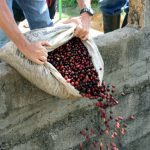Description
Rwanda
Rwanda’s coffee production history dates back to the early 1900s. The Belgian colonial empire forced farmers to plant coffee trees, but Rwandan farmers did not have the proper infrastructure. As a result quality was very poor and exports were limited. Eventually, after the repairs and relief efforts from the genocide that rocked the country, Rwandan farmers were able to focus on producing higher quality coffee as trade barriers and restrictions were lifted. Internationally funded programs such as PEARL trained young Rwandans in the art of coffee cultivation, and quality has skyrocketed since.
Misozi and Kopakaki Co-ops
Misozi Kopakaki is grown in the Karongi District of western Rwanda by over 800 small farmers. The farmers in this area, in an effort create the best coffee possible, have pooled their coffee, resources and knowledge. Forming a cooperative they called Kopakaki. After forming their co-op, they joined a group of co-ops called Misozi to aid in the final processing and exportation of their coffee. The Misozi and Kopakaki co-ops are proudly certified Fair Trade to guarantee transparency and fairness throughout their growing community.








Reviews
There are no reviews yet.